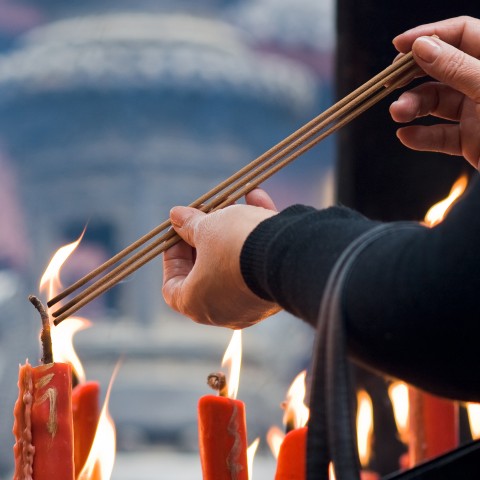HongKongers believe that once a year, hell’s gates open, allowing the spirits to wander the earth. They call this day The Hungry Ghost Festival (or simply Ghost Festival). In this article, you’ll learn about the Hungry Ghost Festival origin and how Hong Kong observes this holiday today.
Hong Kong is a place rooted in strong religious and spiritual belief, and the Hungry Ghost Festival Hong Kong observes is one of many holidays to vividly portray this. Come along with us at CantoneseClass101.com and delve into some of Hong Kong’s most fascinating beliefs and traditions. After all, culture immersion is one of the best ways to master any language!
1. What is the Hungry Ghost Festival?
So, what is the Hungry Ghost Festival history? Where did it come from?
According to Chinese mythology, the very gates of hell are open during the Hungry Ghost Festival. This allows the spirits to enter the living world and roam it until hell’s gates close again.
Regarding the origin of the Ghost Festival, there are actually two theories: One that says Buddhism, and another that says Taoism. Both religions have records of the festival and particular ceremonies; during the Tang dynasty, the Ghost Festival was even observed in mixed customs.
Do you know that according to the Hungry Ghost Festival story, Yama, king of the underworld, is the guardian of the gate of hell? Yama has the “book of life and death” that records all men’s lifespans. His subordinates Ox-Head and Horse-Face escort the soul to the underworld after death.
2. The Hungry Ghost Festival Date
The date of the Hungry Ghost Festival varies each year on the Gregorian calendar. For your convenience, here’s a list of this holiday’s date for the next ten years.
- 2019: August 15
- 2020: September 2
- 2021: August 21
- 2022: August 12
- 2023: August 30
- 2024: August 17
- 2025: September 6
- 2026: August 27
- 2027: August 16
- 2028: September 2
3. Ghost Festival Traditions in Hong Kong
Around the Ghost Festival, some people worship their ancestors at home in a display of filial piety, as well as wish for their ancestors’ blessing. In this respect, some people also burn incense, joss paper, and sacrificial offerings (or Hungry Ghost Festival food) on the roadside in order to feed and fulfill the wandering soul. This ensures that they don’t become poor, hungry ghosts, and this act appeases the grudges of those who died unjustly so they can rest in peace.
Some people may think that this festival is absurd, but for Chinese people, there’s a saying: “Better believe it than ignore it.”
Another tip is that HongKongers usually use the phrase “dirty things” when referring to ghosts. For example, “I see dirty things” means “I see ghosts.”
4. Traditional Taboos
During the Hungry Ghost Festival month, there are a lot of taboos:
- Don’t stay out or up late at night, because ghosts’ power flourishes in the middle of the night.
- Don’t walk close to the wall, because this is where ghosts like to lean.
- Don’t open an umbrella indoors, because this is etiquette when paying respect to the dead—it might invite ghosts into the house.
- Don’t go swimming at night, because it’s easy for ghosts to pull on your legs and drown you.
- Don’t get married, travel, or move.
In short, don’t do any important things.
5. Useful Vocabulary for the Hungry Ghost Festival in Hong Kong
Here’s some vocabulary you should know for the Hungry Ghost Festival in Hong Kong!
- 祖先 (zou2 sin1) — ancestor
- 盂蘭節 (jyu4 laan4 zit3) — Ghost Festival
- 閻羅王 (jim4 lo4 wong4) — Yama
- 孤魂野鬼 (gu1 wan4 je5 gwai2) — wandering soul
- 素食 (sou3 sik6) — vegetarian meal
- 燒包 (siu1 baau1) — varieties of paper items burned for the deceased
- 祭品 (zai3 ban2) — sacrificial offering
- 陰司紙 (jam1 si1 zi2) — Joss paper
- 祭奠 (zai3 din2) — hold a memorial ceremony for the deceased
- 孝道 (haau3 dou6) — filial piety
- 燒香 (siu1 hoeng1) — burn incense
To hear each of these vocabulary words pronounced, check out our Hungry Ghost Festival vocabulary list!
Conclusion: Choose CantoneseClass101 for Your Cantonese Learning!
As you can see, the Hungry Ghost Festival is a time of healthy fear for HongKongers, and the perfect occasion to honor the dead. Is there a holiday in your country for honoring the dead? Tell us about it in the comments!
To continue learning about Cantonese culture and the language, explore CantoneseClass101.com and take advantage of our fun and effective learning tools! Read more insightful blog posts like this one, study up with our free Cantonese vocabulary lists, and download our mobile apps to learn Cantonese anywhere and at your own pace! By upgrading to a Premium Plus account, you can also learn using our MyTeacher program!
We hope that learning about one of Hong Kong’s more interesting holidays gives you extra encouragement to continue on your language-learning journey! We know that Cantonese mastery is no easy feat, but your hard work and determination, paired with our constant support, will bring you success! Keep at it! 🙂













